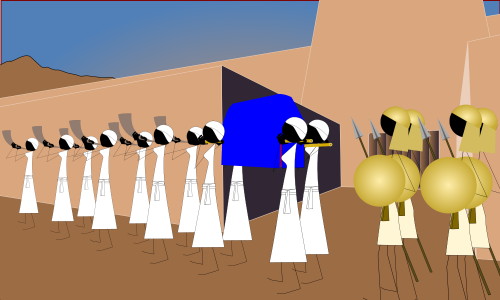
The Book of Joshua is the sixth book in the Torah and the Christian Old Testament. I think that I need to mention that it is the first book of the Deuteronomistic history because that description is bound to come up. The Deuteronomistic History is a recent theoretical invention which claims that behind the present forms of the books of Deuteronomy and Joshua, Judges, Samuel, and Kings (the Former Prophets in the Hebrew canon) there was a single literary work. In other words there were no scrolls of these books before the book of Kings. I do believe that there was a single literary work, all Christians do, but that single author is God, not some man in the 6th century BC. Joshua should be the last book that someone would claim that the hand guiding it was not supernatural. I will show that when we come to his name.
Like several other prophets in the Old Testament, Joshua's ministry symbolically represents the Messiah. Moses represented Christ in several ways but notably in that he showed us the kingdom but did not live to enter with us at that time. Joshua represents the next phase. He led Israel into the Promised Land to give them rest, just as our returning Messiah will lead the faithful into the ultimate land of promised rest. The most outstanding feature of Joshua that supports his destiny in this area was his name.
Author
We do not know for certain who published the modern version of the book of Joshua but we do know that most of it was written by him since the book itself claims that Joshua wrote these words in the book of the law of God
(Joshua 24:26). The book is named for Joshua because it covers the time that he judged Israel, which is from the time that he took over from Moses until his death. The book was annotated after Joshua's death or else it could not contain his death or anything that followed it. That might well have been done by Phineas who seemed to have taken the leading role in Israel during the later years of his father Eleazar the High Priest and Joshua (Joshua 22:13).
Joshua's name was originally Oshea, but Moses changed it to Jehoshua (Numbers 13:16). There are all sorts of explanations given by Hebrew and other scholars but I prefer to stick to the simplicity that it was either inspired by God or a direct instruction given to Moses by God. Moses knew God's name (Exodus 3:14). It was what is often written as Jehovah
and I do not see Moses playing with it without God's consent.
According to Mickelson, Oshea
, Strong's H1954, Hebrew: Howshea
means deliverer
; while Joshua
Strong's H3091, Hebrew: Yhowshuwa
means Jehovah-saved
.
Concerning the name change, Jamieson Fausset Brown Bible Commentary on Numbers 13:16 records Oshea--that is, "a desire of salvation." Jehoshua, by prefixing the name of God, means "divinely appointed," "head of salvation," "Saviour," the same as Jesus
.
The point here is that the name Joshua invokes the name of God Jehovah
, and hence the authority of God on the former Oshea. This same name was commanded to be given to our Lord before His birth, And she shall bring forth a son, and thou shalt call his name JESUS: for he shall save his people from their sins
(Matthew 1:21).
Purpose of writing
God made a promise to Jacob who was renamed Israel
The fulfilment of this prophecy began with the Exodus and Moses, and was completed by Joshua. Israel became a company of nation states each headed by one of Jacob's sons and they were also confederate and acted together in taking over the land. Joshua insisted upon this so that even though some got their inheritance early they were required to remain in the armed forces until the whole land was conquered. The book therefore continues the record started by Moses which he left off at Deuteronomy.
When and where was it written?
Just as with the book of Deuteronomy there are all sorts of opinions about when and where it was written, but if we go by the evidence of the book there is nothing to detract from it being records compiled by Joshua of his progress in carrying out his commission. On one hand scholars
claim that it was written around the time that Judah emerged from Babylonian captivity. As far as I can see the evidence suggests that the book was largely written during Joshua's lifetime and published shortly after with annotations, just as was done with Deuteronomy. For example, Joshua 6:25 [KJV] states And Joshua saved Rahab the harlot alive, and her father's household, and all that she had; and she dwelleth in Israel even unto this day; because she hid the messengers, which Joshua sent to spy out Jericho
, which shows that Rahab was alive when the book was written. To give a sense of the timing scholars date the life of Joshua to sometime between the 15th and 13th centuries B.C. The book was therefore likely written during the conquest of the land of Canaan. Someone might say, how can I just disregard the opinion of scholars
? If you tell me, as the scholars have claimed , that the Book of Joshua holds little historical value for early Israel
, to me it is like saying lamb has little nutritional value for early Israel. Why then would they preserve the consumption of Joshua as history just as why would they continue to consume lamb as food? Or another case would be, if you are the editor and compiler of a volume, why would you preserve things like (Joshua 16:10 [KJV]) And they drave not out the Canaanites that dwelt in Gezer: but the Canaanites dwell among the Ephraimites unto this day, and serve under tribute
, when by the time of the Babylonian exile, the northern tribes (which included the Ephraimites) were long displaced and scattered after the Assyrian captivity? We need to be careful of these scholars
and look for the evidence behind their claims.
To get a further sense of the timing consider this.
That was spoken by Caleb but it makes it clear that Joshua was no child when he subordinated himself to Moses and dedicated himself to the Tabernacle. The Bible calls him a young man (Numbers 11:28). Since Moses met Joshua (Oshea) when they left Egypt and at that time he was already old enough to lead an army (Exodus 17:9) then young man
means a mature and distinguished fighter, able to lead others. Millitary service began at age 20 (Numbers 1:3). The scripture above shows that Caleb was around 40 when they left Egypt. I would say that Joshua was probably mid way between that age and a rookie, the same age that Joseph was when he became Prime Minister of Egypt, i.e. 30. Caleb was 85 five years after Joshua took over from Moses (Moses was with them only 40 years) so by my estimation Joshua would be 75. Joshua died at 110.
The book of Joshua therefore covers at least 110-85+5= 30 years, if Joshua was the same age as Caleb, but more likely about 110-75+5= 40 years based on my estimated age of Joshua. The 5 years are added back in the calculation because Caleb was speaking 45 years after he met Moses, and so Moses was dead 5 years already, meaning that Joshua had already taken over for 5 years. Now we can work backwards starting with the fact that Joshua was with Moses no more than the 40 years that Moses lived after the Exodus. He lead Israel for 40 years accounting for 80 of the 110 years. That leaves 30 as the age he was at the Exodus.
Key verses:
These are especially useful against British Israelism which claim that the promises made to Jacob's children were never fulfilled and that they are now to be fulfilled in Ephraim and Manasseh.
From Hebrews we learn of the objective of Joshua's work and in what way it parallels the work of Christ.
It was to give the Children of Israel rest.
Outline
I like the approach that is found at https://www.britannica.com/topic/Book-of-Joshua because it is simple and straightforward. It divides the book into three sections:
- the conquest of Canaan (chapters 1-12),
- the distribution of the land among the Israelite tribes (chapters 13-22),
- Joshua's farewell address and death (chapters 23-24).
You can also add more complexity like:
- Joshua 1-6 Israel crosses the Jordan River and enter the promised land of rest. They begin their conquest of the land with the city of Jericho.
- Joshua 7-12 Israel loses a battle against the people of Ai because of a prior sin of Achan, for which he is stoned to death by the Israelites. After repenting they go on to prosper in battle once again.
- Joshua 13-21 The promised land gets divided among the tribes of Israel but not all of the Canaanites have been driven out of the land. The Tabernacle is established in Shiloh a name that means tranquility. The Israelites also designate Certain cities as cities of refuge.
- Joshua 22-24 Civil war is averted. It was obsered that
the Reubenites, Gadites, and half-tribe of Manasseh have built an altar at the entrance to the land of Canaan
and the other tribes were ready to dispense justice. Joshua knowing that he was approaching his death, exhorts the people to be faithful. Joshua dies at 110. The bones of Joseph, which the Israelites had brought up from Egypt, were buried at Shechem. Eleazar, the third son of Aaron, also died marking the end of an era.

